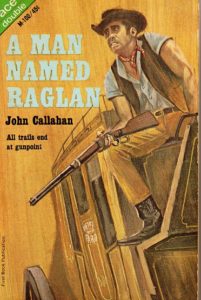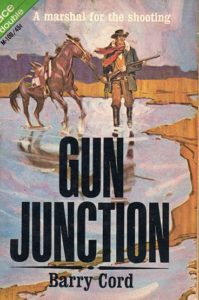Book Review: A Man Named Raglan/Gun Junction by John Callahan and Barry Cord, respectively
While most of the Ace Doubles (two short books fused together and printed upside down from each other) I’ve read are science fiction, Ace also put out mysteries and westerns in the format. This book is one of the Westerns, and is volume M-100, first of the 45¢ series.
A Man Named Raglan takes place during the Civil War, as Nevada Territory becomes a state. Wells Fargo shotgun rider Dan Raglan isn’t much fussed about it. He did his bit for the Union up until his leg took a bullet at Chancellorsville, and that’s the end of the war for him, thank you. His stagecoach driver partner Steve Munson is more concerned. Munson’s a loyal son of the South, and doesn’t like how it’s getting whipped, and Nevada’s coming in on the side of the North.
Neither of them is pleased when they’re ambushed by road agents claiming to be Confederate irregulars here to confiscate that sweet Wells Fargo moneybox for the war effort. When it turns out Wells Fargo hadn’t sent any cash on this trip, the owlhoots have to settle for robbing the passengers instead. They had the drop on Raglan through the robbery, but as the robbers are departing, one’s horse shies, and Raglan has a chance to bring his rifle to bear.
Raglan is about to squeeze the trigger when the road agent’s mask slips–and he recognizes the man as Bob Worden, kid brother of Elizabeth Worden, the woman Raglan is courting. Raglan hesitates just long enough for Bob to regain his balance and escape.
Munson is furious and accuses Raglan of cowardice. the two men have a fist fight that reflects well on neither of them, but female passenger Lil Shannon seems to sympathize more with Raglan. Raglan refuses to identify Bob, even when crack Wells Fargo agent Ben Nasmith asks him directly, so he’s out of a job.
Elizabeth isn’t particularly grateful about Raglan shielding her brother, as she doesn’t believe Bob could have been involved in the first place. Oh, and the gang Bob was with has realized that Raglan can finger one of their members, and wants the former shotgun rider dead to prevent that. For a man who thought his war was over, Raglan’s got a lot of fighting to do!
This is a decent enough Western, and I like how Raglan’s bum leg realistically causes difficulty for him. He spends a good half of the time laid up in bed one way or another.
Less good is some historical sleight of hand that allows Raglan (and by extension the reader) to admire his Confederate foes, considering them honorable men fighting for an almost worthy cause. There is zero mention of slavery, and not one black person appears, despite Virginia City’s actual demographics at that time in history. The latter was typical of Westerns in the 1960s, but it sticks out like a sort thumb because of the storyline.
From Raglan’s perspective, there’s a mystery element to the story, but savvy readers will figure out the big twists well ahead of him.
Gun Junction is set in Texas. The small town of Fulton has been taken over by Luke McQuade’s gang of outlaws. They lynched the sheriff, beat the deputy so bad he’ll never come back, and murdered the U.S. Marshal who came into town to avenge the sheriff. Also, for some reason, they seem intent on preventing the Desert Line Railroad from being finished.
Deputy Marshal Matt Vickers is the next lawman to ride into town, though he comes incognito. He’s brought two other men, ex-Ranger Doc Emory, and hard-bitten Kip Billens, the brother of the murdered sheriff. Each of the men carries his own burden of secrets, and not all of them will leave Fulton alive.
This is a dark-themed and brooding story, and is better about delivering its twists than its partner. (The book’s blurb did give a bit too much away.) Overall, it’s better-written, too.
Both books use the “protagonist interrupts jerk who’s hitting on an uninterested woman who then takes an interest in the protagonist” cliche–Gun Junction plays it out better as while the young woman in question does fancy Matt Vickers, she’s fully aware he’s not a good long-term marriage prospect. Also, both books have the phrase “don’t make war on women.”
I am given to understand that Gun Junction was later reprinted separately, and that may be a better bet than trying to track down the relatively rare Ace Double printing.


